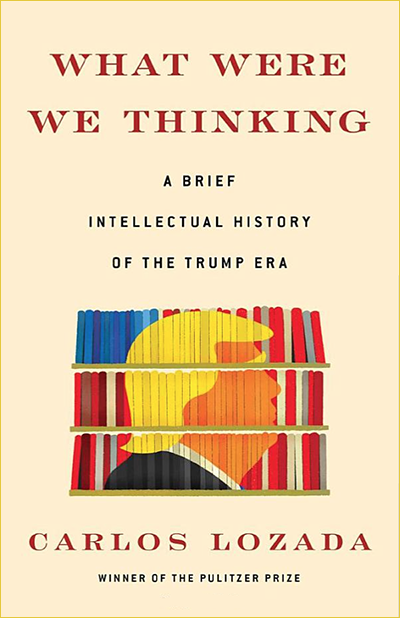||| BY JENS KRUSE |||

Carlos Lozada, the Pulitzer-Prize-winning nonfiction book critic of The Washington Post, has done us a great service. With a heroic combination of persistence, diligence, stamina and masochism he has read around 150 books about Trump, Trumpism, and the Trump presidency, and has distilled them for us into the “Brief Intellectual History” of his sub-title.
In his “Introduction,” Lozada sketches out his project:
One of the ironies of our time is that a man who rarely reads, preferring the rage of cable news and Twitter for hours each day, has propelled an onslaught of book-length writing about his presidency.
Dissections of the white working class. Manifestos of political resistance. Works on gender and identity. Histories and memoirs of race and protest. Surveys of populism, authoritarianism, and anger. Investigations of political extremism. Polemics on the future of left and right. Debates and proposals on immigration. Studies on the institution of the presidency and the fate of democracy. And, of course, plenty of books on Trump himself – his values, his family, his businesses, and his White House. (2)
He continues:
But if journalism is still history’s first draft, then books remain the first draft of how we think about that history, how we seek our place in it. That is the spirit of this exercise, to which I bring nothing more than the discipline of a dedicated reader and the zeal of a new American. The 2016 presidential election was my first as a U.S. citizen and voter, and Trump’s rise in national politics has coincided almost exactly with my time as book critic. The demands of both literature and citizenship will forever shape the way I view this presidency. (6-7)
Lozada uses the characterizations of the genres of Trump books as the organizing principle of his book. His ten chapters are: “Heartlandia,” “Resistible,” “The Conservative Pivot,” “Beyond the Wall,” “True Enough,” “See Some I. D.,” “Him, Too,” “The Chaos Chronicles,” “Russian Lit,” and “In Plain View.” In each of these chapters he reviews some 15 books, which are listed in a bibliography at the end of the chapter.
One of the services that Lozada provides to us is that he makes clear that many of the books he has made himself read leave many things to be desired. Some of these subgenres, in his view, are more likely to be populated by books of dubious quality and limited usefulness. Some examples of Heartlandia, Resistible, The Chaos Chronicles, and Russian Lit come in for some serious snark, as when he points out – in assessing some of the Resistance literature — that “[t]here is a difference between being righteous and being right (40)” and when he takes to task Michael Wolff’s 2018 chaos chronicle Fire and Fury not just for “the typos and minor errors (170)” littering it but also for the ‘’ dubious versions of reality his book offers (170).” But beyond that Lozada’s book provides lucid and fair evaluations of this vast Trump literature and gives us insight into what we were thinking.
But perhaps Lozada’s greatest service to his readers comes in his “Epilogue” where – after all the sifting and winnowing he has done in the ten chapters of his book — he selects twelve titles “that have best helped me make sense of this time, the ones I suspect I’ll revisit long after the Trump era has become a subject for works of history (244).” I will list them here with their abbreviated titles: Jennifer Silva, We’re still here; Timothy Snyder, On Tyranny; Yuval Levin, A Time to Build; Erika Lee, America for Americans; Greg Grandin, The End of the Myth; Russell Muirhead and Nancy Rosenblum, A Lot of People Are Saying; Patrice Khan-Cullers and asha bandele, When They Call You a Terrorist; Robert Mueller III, Report; Chanel Miller, Know My Name; Michael Lewis, The Fifth Risk; Susan Hennessey and Ben Wittes, Unmaking the Presidency; Carol Anderson, One Person, No Vote.
Carlos Lozada’s What Were We Thinking: A Brief Intellectual History of the Trump Era (New York: Simon & Schuster, 2020) will soon be available from the Orcas Library or can be obtained through Darvill’s Bookstore.
**If you are reading theOrcasonian for free, thank your fellow islanders. If you would like to support theOrcasonian CLICK HERE to set your modestly-priced, voluntary subscription. Otherwise, no worries; we’re happy to share with you.**








“Dale Farrick” is another fake name that should be blocked. Nobody with that name in the state voter rolls or owning property in SJ County. Nothing in White Pages either. And what does this information have to do with Jens Kruse’s review? Absolutely nothing — from yet another nobody.
And now for a real comment about the article. I cannot imagine reading 150 books about the Orange One! Ten was enough, including three in Jens Kruse’s list, which is a good one. Especially “Tyranny” by Yale historian Timothy Snyder.
Hi Michael,
Thanks. I can’t take credit for that list. It’s Lozada’s, not mine.
My mistake. And it looks like the irrelevant comment by “Dale Farrick” that I complained about was taken down this afternoon.